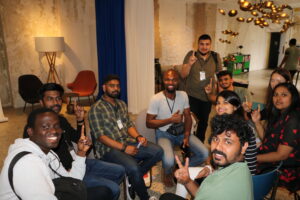By Stefanie Herta – DEGIS National Marketing & Community Manager
Being an International Student can sometimes feel like living life on a rollercoaster. Therefore, I wish to share with you some tested stress management strategies to thrive during exam season and beyond!
As a graduate of Psychology, Commerce and an international student here in Germany just like you, I’ve had my fair share of stressful exams! From having essay-style exams in German, to presenting complex topics to a panel of examiners on psychological topics, the ways that exam season can stress us out are endless. However, we also face unique challenges that our local peers might not experience, and are often invisible to those around us. In fact, exams are just the tip of the iceberg.
Our Stress Iceberg
The “Stress Iceberg” of international students runs deep:
Beneath the surface, we are faced with…
…and that’s just to name a few of them.
The Stress Continuum
The good news is, have the power to not only manage stress, but shape it to our advantage – turning “bad” stress, into “good”!

- Good Stress (Eustress): Motivates us, enhances performance, and provides excitement.
- For example: Feeling somewhat nervous or “hyped up” before a competition can help you perform better. A natural and balanced release of adrenaline improves performance and focus.
- Bad Stress (Distress): Leads to anxiety, decreased performance, and health problems. Often chronic
- For example: An intense study and work schedule with a lack of resources can be particularly harmful.
Stress exists on a continuum, and having the right stress management strategies can turn stress into your favor. So how do we stay clear of the “danger zone” and manage stress during exams (and beyond)?
Stress Management Techniques
Here are some practical techniques against (dis)stress that you can implement right now:
Focus on What You Can Manage and Prioritize
As frustrating as it can be, we can’t control everything. However, we can identify and focus on the areas of our lives where we have the most control, and take direct action.
- For example: Holding a speech in front of a large audience. By only focusing on preparing your speech, you can boost your confidence and reduce anxiety.
Reach Out for Support & Mentorship
You deserve all the support you can get. Don’t hesitate to reach out to others such as friends, family, tutors or professional services. Tackling stressors together tends to be much easier!
Take Strategic Breaks
Regular breaks help reset your system and prevent burnout.
- Pomodoro Method: A widely popular method invented by a university student, Pomodoro allows you to increase your attention and prevent procrastination.
- Simply set a timer for 25 minutes, then take a 5 minute break.
- After 4 “Pomodoros” take a longer 15-30 minute break.
- (Of course this can be adapted to your needs)
- Here’s a Pomodoro timer!
Tidying Your Study Space & Online World
- Tidy your study space: Counter distractions and long sitting-hours by organizing your study space. A tidy room is a tidy mind!
- Tidy your online world: Unfortunately, the increase in toxic social media content can compound on our stress levels.
- Filter your followers list and adjust your content settings to maintain a peaceful day!
Make Studying Rewarding
- Try to treat yourself to something you enjoy after you achieve a study or work goal.
- Examples: Buying a desert, meeting with friends, watching a movie…
- Have you ever seen that meme “getting that dopamine hit from ticking off my to do list”? There’s truth to it, actually!
- Dopamine is triggered in the brain when accomplishing/finalizing your goals.
Consider Your Sleep Chronotype
- When it comes to sleep, “one size does not fit all”!
- Are you a night owl, or an early bird?
- Each of us has a unique “chronotype” (our sleep body clock), and this influences our energy levels throughout the day.
- For example: Night owls tend to have more energy towards the evening, and can excell at writing and other creative activities during this time.
- Therefore, some night owls purposely schedule basic tasks earlier on in the day, but leave term paper writing until the evening!
- Each of us has a unique “chronotype” (our sleep body clock), and this influences our energy levels throughout the day.
- Rearranging your study schedule to match your chronotype can significantly improve your productivity and manage stress.
Increase Self-Compassion
- Be kind to yourself by:
- avoiding comparisons with others, particularly local peers who may not be going through the same struggles.
- thinking about your past triumphs and acknowledging how far you have come.
- Be kind to yourself by:
By embracing these practical strategies and prioritizing self-care, we can transform exam stress into a manageable and even motivating part of your academic journey.
Become a community member with DEGIS (free) for lots of support and resources to help you thrive as an international student in Germany!






